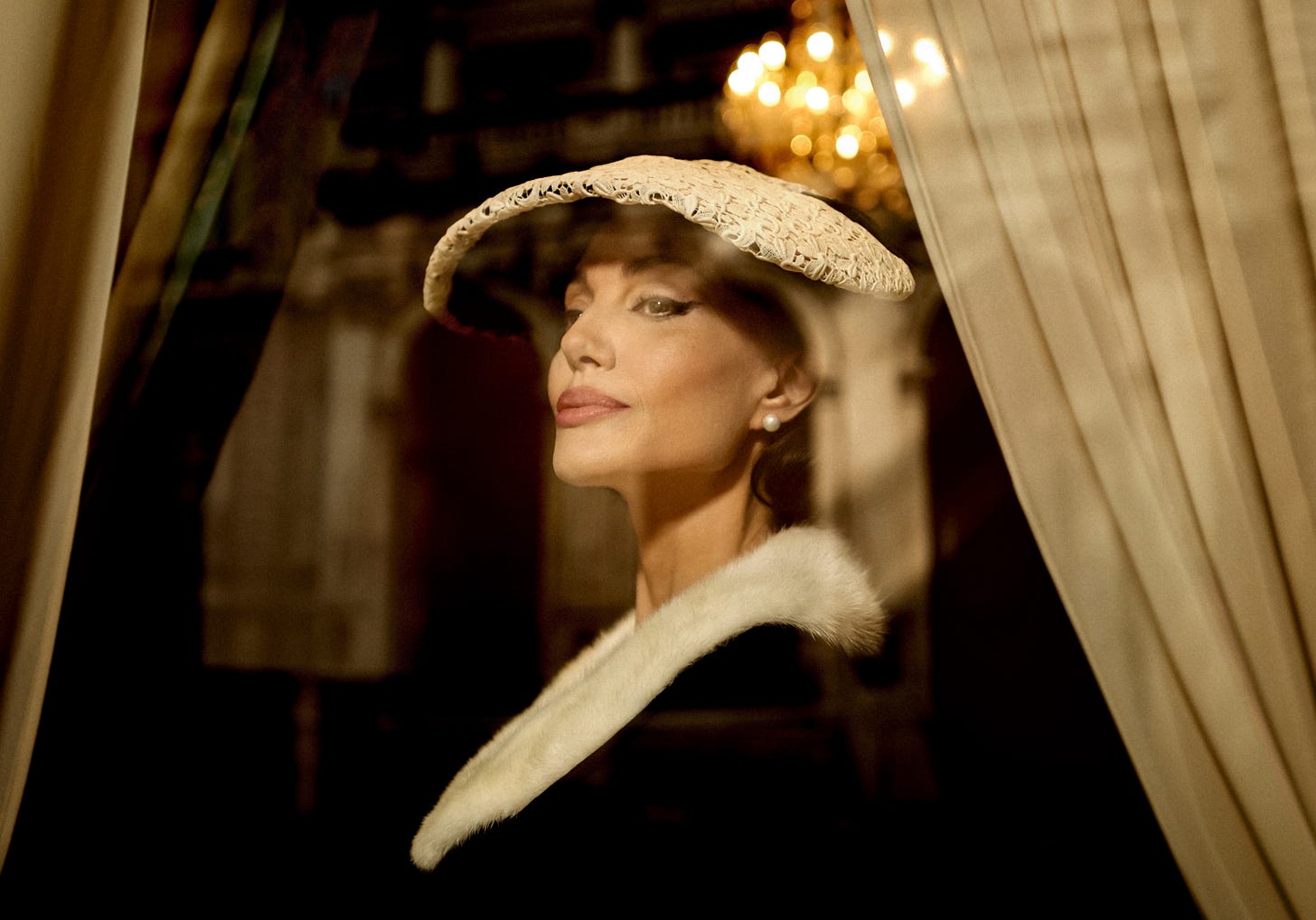What to watch in cinemas this week | Nov. 28–Dec. 4
The Seed of the Sacred Fig, Queer, Maria, and Emilia Pérez.
Each week I provide a somewhat-curated list of films to see in cinemas. Meant as more of a resource than weekly essay, you can refer to this series whenever you feel like going to the movies. Also, can check out previous weeks’ selections because those films might still be in theaters.
(Note: I’ll be on the way to an IMAX double feature of Gladiator II and Wicked by the time this email reaches you. It’s financially irresponsible of the studios not to at least try and capitalize on Glicked, whether that be through fake social media hype or cross-promotional Paul Mescal, Ariana Grande events. Reviews have been lukewarm so far for both—I don’t trust the fandom coming in hard for Wicked. One is the 160-minute part one, the other is a sequel made two and a half decades later. It’ll also be my first time with an American audience in almost two years, so I’ll be monitoring the “vibes”.
Recommendation of the week
The Seed of the Sacred Fig (Mohammad Rasoulof)
Along with No Other Land, The Seed of the Sacred Fig by Mohammad Rasoulof is as subversive as one can be. They defy state censorship and are handled poorly by distributors scared of future business. Rasoulof’s story in particular is dangerous in the way that should embarrass others using that word: he’s been arrested three times for making films against the Islamic Republic of Iran; after Cannes announced they would premiere Sacred Fig, Iranian authorities interrogated the cast and crew, banned them from leaving the country, and a week before the film festival, his lawyer announced he was sentenced to eight years in prison along with flogging, fines, and property confiscation for making “propaganda”; Rasoulof and some crew members then fled to a location with a German consulate, where got a travel document based on his fingerprints and flew to Berlin, then attended the Cannes premiere of his film a week later. The two main actors in the film, Soheila Golestani and Missagh Zareh, remain in Tehran, who have been outspoken critics against the regime. Even the film itself had to be smuggled out of the country, which was assembled/edited in Hamburg; and now the film is Germany’s entry into the Oscars.
Plot bio: An investigating judge in the Revolutionary Court in Tehran grapples with mistrust and paranoia as nationwide political protests intensify and his gun mysteriously disappears. Suspecting the involvement of his wife and their two daughters, he imposes drastic measures at home, causing tensions to rise. Step by step, social norms and the rules of family life are being suspended.
A not dissimilar things happened to Rasoulof’s filmmaking buddy Jafar Panahi with No Bears, which appears to be the new norm for Iranian filmmakers speaking truth to power.
Rasoulof included graphic violence of protestors beaten by the IRGC in the final edit, which certainly threw it over the edge for the censors.
Releasing in Germany on Christmas.
American releases
Queer (Luca Guadagnino)
I’m not a big fan of this film. It felt like Guadagnino wanting to thread the needle between the psychedelic aspects of Suspiria and chill, vacation queer vibes of Call Me By Your Name, but then did neither that well. Adapted from the William S. Burroughs novel, the film doesn’t capture the kind of Beat/postmodern style that Burroughs helped invent with Queer. The most interesting aspect is seeing Daniel Craig really go for it more than any other post-Bond (and was recently interviewed about the role’s “deconstruction” of masculinity in the New Yorker).
Plot bio: In 1950s Mexico City, William Lee, an American expat in his late forties, leads a solitary life amidst a small American community. However, the arrival in town of Eugene Allerton, a young student, stirs William into finally establishing a meaningful connection with someone.
Releasing in German on Christmas.
Maria (Pablo Larraín)
Starring Angelina Jolie, this is Larraín’s third in his famous-women bio-pics (Jackie and Spencer). I barely missed this at Venice, but it seems like I didn’t miss much. It’s nice to see Jolie back out on the awards circuit instead of the media rags disputing with an Ex; we all hope to see her more often.
Plot bio: 1977: Maria Callas, once the world’s greatest opera diva, lives in seclusion in Paris with her staff and her two poodles. Her health is getting worse and worse. Then she receives a request to go on tour again. Will La Callas sing again? And if so, for whom?
Limited release from Netflix.
German releases
Emilia Pérez (Jacques Audiard)
won the Jury Prize and the female ensemble (Karla Sofía Gascón, Selena Gomez, Adriana Paz, and Zoe Saldaña) won a collective Best Actress at Cannes. Unfortunately, Netflix picked it up from France and it had a lackluster American release before streaming two weeks later. Not much incentive or intrigue to watch this at a theater, which sucks, so I hope all of you in Germany can be nudged to the local Kino.
Plot bio: Rita, an underrated lawyer working for a large law firm more interested in getting criminals out of jail than bringing them to justice, is hired by the leader of a criminal organization.
The French entry for the Oscars.
Thank you once again for checking out my Substack. Hit the like button and use the share button to share this across social media. And don’t forget to subscribe if you haven’t already done so.







